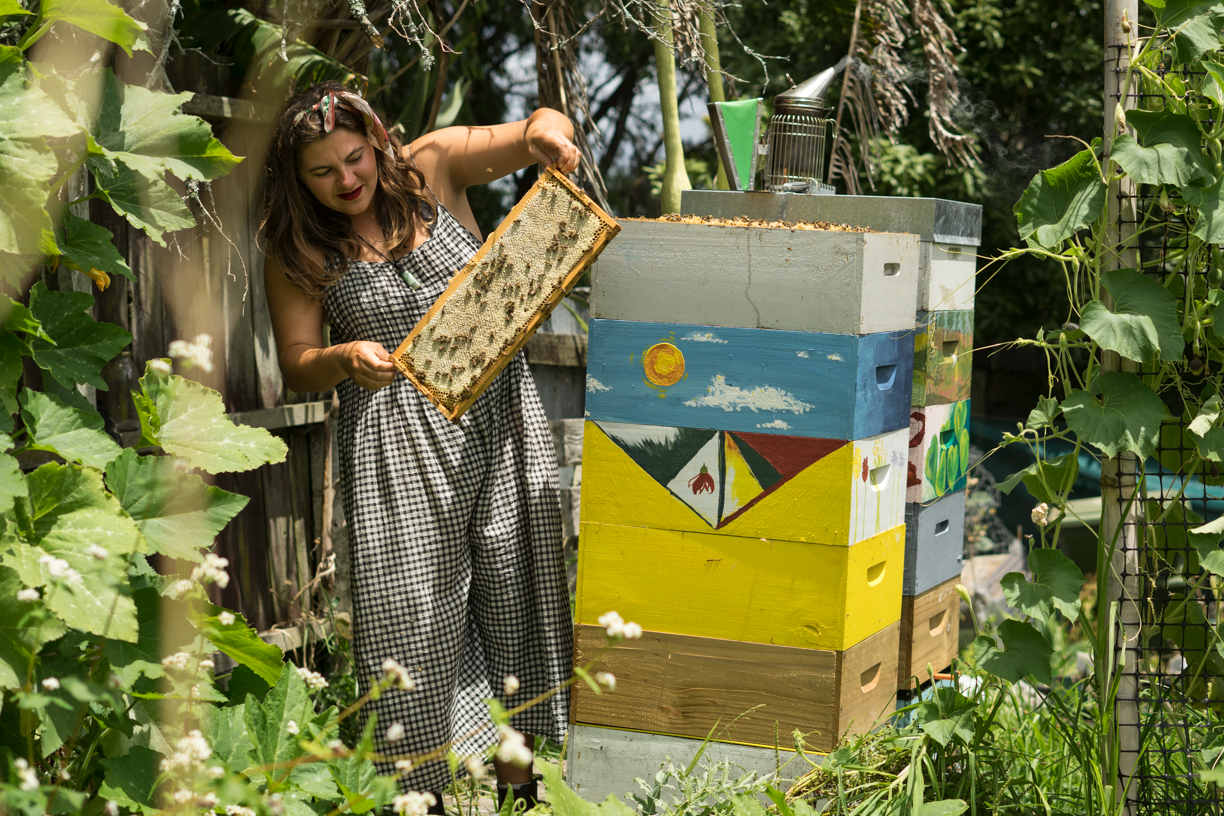Words and photography Sophie Merkens
Meet Andres Villegas, Ella Rose Shnapp and Michel Sluysmans, three beekeepers who are in it for the love of bees. Each practises bee-first beekeeping, putting the welfare of their hives before profit and commercialism.
Andres
Andres heads out early morning to check on his honeycomb, which is a hexagonal wax structure made by the bees to store eggs or, in this case, honey. Today he’s left Tana sleeping at home, though normally his beloved dog accompanies him to work.
His artisanal company Honey by the Sea is just that – a whole lot of hives in picturesque spots around Matakana, Leigh and Pakiri, all with different but splendid views of the sea. Though Andres comes from a science background and worked for three years for a larger commercial beekeeping company, he now enjoys his flexible outdoor lifestyle and the freedom to beekeep how he sees fit.
When Andres worked for the large firm he wore a beekeeper suit but was encouraged to work with his bare hands, which he admits took a bit of getting used to. Over the years as he’s become more confident, he has pretty much discarded the suit. It sits in the back of the truck (just in case) with his surfboard (also just in case).
Andres’ relaxed nature is reflected in the way he works with his hives, and in the calm nature of his bees. He says being a bare-hand beekeeper (and mostly a suit-free beekeeper) is not about showing off. It’s about having a calm approach, feeling gratitude, respecting the bees and the environment, and enjoying the process. He says his job is about nurturing, understanding and embracing the bees.
Andres puffs a little smoke at the beehive’s entrance before slowly opening the lid. He wedges his metal hive tool, an essential multi-purpose tool for beekeepers, between the honey frames and carefully pulls out a heavy frame, laden with pure, fresh honey.
“You have to be slow to be gentle,” he says as he lifts honeycomb from the hive. “If you are more gentle you build up a relationship with the bees, which I think is even reflected in the product.”
Andres isn’t interested in over-expanding his business, he’s focused on quality, not quantity. He embraces the idea of seasonal honey, aiming to highlight the differences in his products. He’s just brought out a honeygar, his manuka honey combined with organic apple cider vinegar. “It’s old-school medicine made delicious.”
Andres takes some honeycomb home to enjoy with his partner, Pamela. He begins to chop the honeycomb up, simply by placing it on a chopping board and slicing it with a kitchen knife. He smiles broadly as he cuts the comb, then shares it with her. “I think it tastes better coming from a happy hive,” she says, with a mouthful of the golden deliciousness.
Ella Rose
Ella Rose may just be the most passionate urban beekeeper in New Zealand. She facilitates The Bee School with For the Love of Bees, teaching people a bees-before-profit way to care for bees and the environment in which they live. At her flat in Grey Lynn, Auckland, she brews up a pot of homegrown calendula flower tea, while her favourite chicken Lucille clucks loudly in the backyard, where Ella Rose’s two hives are found.
Ella Rose has had her own hives for four seasons now (two seasons in New Zealand) and incredibly has never once been stung by her own bees.
Outside in her organic, pesticide- and glyphosate-free garden, she opens up one of her beehives, which is almost as tall as she is, with four of the six boxes laden with fresh honey. Ella Rose says working with the bees is like a meditation, and she continually learns from them. “I have learned so much from the inner workings of a colony, in terms of how we can work together as people. The more I’m inside a hive, the more I learn about a really cool matriarchal society,” she says.
Ella Rose makes candles and balms from the beeswax, and shares her honey with her partner, flatmates and friends. She also sells her Humble Bee Honey to the wider community. “I love the fact that it’s almost a jar of joy that you can share. I love enabling people to try honey that’s come from a few doors down or within their neighbourhood, and not some big industrious force.”
But she’s not just in it for the honey – in fact her number one motivator is to provide a safe habitat for honey bees and all insects. She explains that honey bees are unique as they are probably the only insect that provide a food source greater than their own needs, which humans can then utilise. She stresses that in this day and age with the commercial way of working with land, most insects are in extreme danger, which means our ecological systems are collapsing.
She’d like to see more urban and commercial beekeepers taking responsibility and planting more pollinator safe foods that the bees and other insects need to survive, and considering how they could use beekeeping to improve habitats for all insects.
Michel
Michel drives his ute up a rural road and across a field past curious sheep, until he reaches a wall of kānuka trees that protect his hives from the wind. The view from the farm is over the water, with Little Barrier silhouetted against the sea, and the Coromandel Peninsula in the distance.
After opening the lid of a hive, he scrapes some propolis from the top, a medicinal sort of ‘bee glue’ that has a distinct spicy flavour. He begins chewing on it, which instantly sticks to his now-ochre coloured teeth. Michel checks the hexagonal cells for any sign of varroa mites (a common parasite to the honey bee), pointing out the varroa prevention and treatment strips. He explains that slow beekeeping does not mean leaving the bees to nature, it’s about taking the time to read the bees and help them thrive.
While Michel works for a small business with five full-time employees, he takes every opportunity he can to work intuitively and mindfully within the boundaries of a commercial company, creating a more balanced and symbiotic relationship with the bees.
While he works fairly harmoniously with the bees, Michel is well aware there is inherent potential for dangerous consequences. Sometimes, when it’s bad weather or there is an aggressive hive, he dons his beekeeping suit, or wears just the veil top, which he calls his “bee-kini”.
Most days, though, to the amusement of his suited colleagues, he works in shorts and a T-shirt. “I don’t think of it as me getting stung, I think of it as a bee dying, so I try my best to be gentle,” he says.
As idyllic as the setting is, the reality is Michel and his colleagues work long hours throughout the year, especially in spring when they split healthy hives to create new colonies, prepare for honey flow, and spend numerous pre-dawn hours on the road transporting hives to orchards for pollination. But when he talks beekeeping he dons a huge smile and his eyes light up; there’s no need to verbalise bees are his passion – his expression does it for him.





